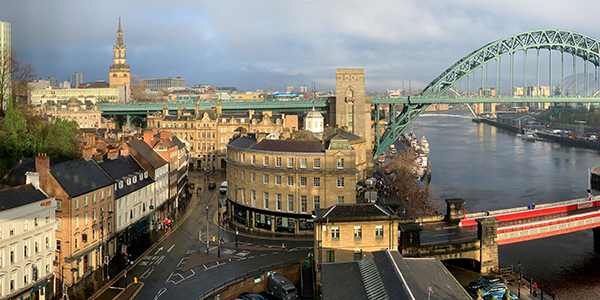The North of Tyne mayoral election: can a ‘mini metro-mayor’ make a difference?
The new mayor for the North of Tyne Combined Authority, Jamie Driscoll, starts his mandate this week. Arianna Giovannini asks whether, with a limited budget, few powers and heading a combined authority with an unusual geography, Driscoll can deliver on his radical policy agenda.

Tyne bridges. Photo: John Mason/(CC BY 2.0) licence
On 2 May, a new metro-mayor was elected to lead the North of Tyne Combined Authority (NTCA), which encompasses Newcastle, North Tyneside and Northumberland. Jamie Driscoll joins the seven combined authority (CA) mayors that entered office between 2017 and 2018. Metro-mayors were created to add democratic accountability to the devolution deal process initiated by central government since 2014. However, devolution in England was conceived as, and remains, a ‘mixed bag’: five years on, it still lacks a clear framework; it’s based on artificial geographies built around opaque functional economic areas; and powers and funding vary considerably across the CAs that were offered a deal. Against this complex background, the case of the NTCA devo deal and metro-mayor stands out as a particularly interesting one.
Overall, five candidates stood for the mayoral election: John Appleby (Liberal Democrats), Jamie Driscoll (Labour & Co-operative Party), Charlie Hoult (Conservatives), William Hugh Jackson (UKIP), and John McCabe (Independent). Driscoll was the favourite, and ended up winning, gaining 33.9% of the vote in the first round, and achieving the outright majority needed in the second-round count against Hoult. The turnout (31%) was, perhaps unexpectedly, quite high in comparison with previous metro-mayoral elections. In many respects, Driscoll represents a break with the Labour establishment and, despite having been a councillor only for a year, he beat Nick Forbes (Newcastle City Council’s high-profile leader) for the party’s nomination. This makes his mayoral victory even more remarkable – but, arguably, the path ahead for the new metro-mayor is far from straightforward and he is likely to face a number of challenges as he takes on this new role.
Firstly, his manifesto is quite ambitious. Driscoll presents himself as a ‘proud socialist’ and a Corbynista, and ran a mayoral campaign coherent with these stances. Levelling the playing field to help those with lower incomes was one of his key priorities, and his pledges are very much in line with New Municipalism experiments that we’ve seen emerging in some local councils as a response to austerity and cuts. ‘Community Wealth Building’ is Driscoll’s first policy commitment, and so his first challenge to implement in office. In practice, according to his manifesto, this entails the creation of a ‘procurement framework’ that allows local businesses to win public sector work, setting up a a ‘people’s bank’, to offer support for small and worker-owned businesses and a pledge to boost wages, which includes making the NTCA a real living wage employer. He is also committed to creating community hubs to revitalise local life by turning underused buildings into public spaces, and to tackle climate change, making the North of Tyne a net-zero carbon region by 2030. In principle, Driscoll’s pledges could be seen as admirable. Evidence from the UK and beyond shows that such policies, which focus on local wealth building, can play a key role in democratising the economy, addressing inequalities and improving local governance. Indeed, some have gone as far as claiming that under the leadership of the new mayor the NTCA could become the centre of a new, radical politics. What remains to be seen, however, is how this ambitious and radical programme of reforms can be put into practice by the new NTCA metro-mayor’s office.
This leads us to the second challenge: the metro-mayor’s powers. Driscoll will have to work with the NTCA members (i.e. Newcastle, North Tyneside and Northumberland councils) to deliver ‘a vision for social and economic prosperity’. Whilst the new metro-mayor will be able to make some decisions independently, these will be subject to scrutiny within the combined authority. Although most of the areas within the North of Tyne are traditional Labour strongholds, the results of the recent local elections show that, while the party has managed to ‘hold’ its councils, its support is in decline. One of the three councils within the NTCA, Northumberland, is also Conservative-led. In this context, it is plausible to question whether a radical New Municipalism policy agenda will be easy to pass.
Beyond party politics, the NTCA mayoral model is much weaker than its counterparts across England. Powers devolved include only skills and adult education, business support and access to an investment fund of £20m a year over 30 years – a fraction of what has been offered to other CAs. Power and resources are central to what the new NTCA metro-mayor can achieve in practice. Whilst, for example, as explained in an excellent report produced by the Centre for Urban & Regional Development Studies (CURDS), the pro-capita figures for the investment fund could be quite favourable for the NTCA members, there remain a number of issues that could hamper the new metro-mayor’s ambitions. Indeed, the new resources that will be brought in with the devo deal have to be set against a trend for squeezed finances in service spending, and don’t go far enough to make up for the substantial cuts in national funding experienced by the councils that constitute the NTCA. Furthermore, a lack of powers on key policy areas such transport, housing and welfare will place severe limits on Driscoll’s clout. More broadly, the weak powers and resources available to the new metro-mayor put into question the extent to which he might be able to address long-standing economic, social and spatial inequalities that affect not only the NTCA area, but the wider North East.
Another point to consider is the geography of the NTCA devolution deal. Whilst central government has failed to produce a clear framework for devolution in England since its inception in 2014, it has kept insisting that ‘functional economic areas’ provide the most suitable scale for the deals. This rationale has been used to refuse, for example, requests for region-wide devolution deals such as the one recently proposed by Yorkshire leaders. And yet, the NTCA, which has full support from the government, is far from being a coherent functional economic area. The new combined authority has emerged from the ashes of the failed North East devolution deal that was offered to seven local authorities in 2016, but was eventually voted down by Gateshead, South Tyneside, Sunderland and Durham. CURD’s report aptly defines the new NTCA deal as a ‘political and administrative fix between national and local government’, highlighting how the area is too small and most of its economic networks (not least in terms of travel-to-work areas) stretch beyond its boundaries, especially to the south of the Tyne. Crucially, as the report emphasises, ‘the lack of geographical alignment between public policy-making and delivery institutions in the North of Tyne and the wider North East will require much effort and time in co-ordinating and joint working’. As such, the new metro-mayor could be caught in a set of complex governance relations open to potential frictions between NTCA members and other councils in the region. This could affect Driscoll’s authority, and could also shift his attention away from his electoral promises – thus impacting on his ability to deliver across the board.
Finally, and related to this, Driscoll could also find himself leading an institution that makes little sense to the local population. One of the main criticisms, in this sense, is that the North of Tyne is an artificial place born out of political and administrative thinking rather than sense of belonging, and it would be hard to find anybody who identifies with or feels they’re from the North of Tyne. If one of Driscoll’s manifesto promises is to concentrate on community wealth building, one might wonder whether this could ever be realistically achieved in an area that lacks any organic sense of community in the first place.
All in all, it seems hard to disagree with the claim that the NTCA one will be at best a ‘mini metro-mayor’. This, of course, does not necessarily mean that Driscoll is bound to fail. The real problem is a structural one – and has got more do to with the way in which central government conceives of devolution in England than with the political vision of radical left-wing mayor. On the one hand, Driscoll’s ambitious agenda could bring in fresh thinking to the mayoral office. On the other, however, governing a small CA that is neither built around a coherent economic geography nor a strong sense of community and belonging, and with limited powers and resources at his disposal, could reduce his political voice and set him up for a considerable challenge. From this angle, the case of the new NTCA metro-mayor seems to show, once again, the limits of the current devo deal strategy – which hampers the ability to build and develop a coherent devolution agenda from the bottom up, based on local (rather than central government’s) visions and priorities.
This post represents the views of the authors and not those of Democratic Audit.
About the author

Arianna Giovannini is Senior Lecturer in Local Politics and Deputy Director of the Local Governance Research Centre at the Department of Politics, People and Place, De Montfort University. Her research focuses on devolution, governance rescaling, territorial and local politics – with particular emphasis on the ‘English Question’ and the case of Northern England. She tweets @AriannaGi.





 Democratic Audit's core funding is provided by the Joseph Rowntree Charitable Trust. Additional funding is provided by the London School of Economics.
Democratic Audit's core funding is provided by the Joseph Rowntree Charitable Trust. Additional funding is provided by the London School of Economics.
It isn’t an unnatural geography – it is the old Northumberland County area of twixt the Tyne and Tweed. The name is tripe though
How amazingly ignorant we are about democracy! That’s me, most people and especially the government. Academia offers what it can, but I’m interested in what are the potential benefits of democracy, how they can they be achieved – and how those functions operate within our individual and social psyches.
Of course, we as citizens and territorial animals, have to have a defined geographical area over which we can have control and be responsible for.